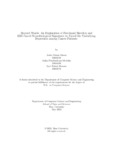Beyond words: an exploration of free-hand sketches and EEG-based neurobiological signatures to unveil the underlying depression among cancer patients
Abstract
Mental well-being is intricately intertwined with physical health and is considered a crucial aspect of an individual’s overall well-being. Due to ever-deteriorating health conditions and uncertainty about the future, people who go through life-changing events like cancer diagnosis are more vulnerable to feeling a wide range of emotional distress such as shock, denial, fear, anxiety, depression, etc. However, low patient-to-psychologist-and-psychiatrist ratios, lack of literacy, social stigma, sensitivity regarding seeking professional help, etc. greatly affect the reliability of existing interview or self-reported questionnaire-based depression screening. Moreover, traditional methods are primarily based on verbal communication, which may not be the most effective way to assess, particularly for non-verbal individuals or those with limited communication skills. To address these issues and broaden the scope of depression diagnosis, our research delved into the potential of incorporating free-hand sketching and EEG features into the depression screening process. In this regard, an in-depth study was conducted among cancer patients of different stages, e.g., stage-1 (n = 25), stage-2 (n = 20), stage-3 (n = 19), and stage-4 (n = 2). Along with demographic data, we collected two free-hand sketches with a theme of ‘self-reflection’ or how they see themselves before and after diagnosis, from each of them. An affordable, consumer-grade, lightweight EEG headset was also used to collect brainwave signals from the participants during their sketching sessions. We identified several potential neurobiological signatures using the EEG signals. Moreover, we used several computational algorithms and manual processing techniques to identify the presence of indicators (hair density, line boldness, dual stroke, lip line, presence of tears, presence of the lower body, and overall body weight depiction) and also to extract dimensional measurements from the images of the free-hand sketches. We found the after-self-reflection sketches of depressed participants to be significantly smaller than the before-self-reflection ones. We used these extracted features, along with demographic data, to train multiple machine learning models for potentially screening depression among cancer patients. Among them, the Support Vector Machine (SVM) model gave the highest accuracy (85%). We developed a Random Forest model with a better accuracy of 94% by integrating relative EEG power with the previously used data. We validated our findings using the PHQ-9 depression screening scale results that were gathered during the data collection phase. Our approach of utilizing EEG-based neurobiological patterns and free-hand sketches allows for the elicitation of naturalistic expressions through non-verbal communication. As a result, our study can pave the way for large-scale research on this relatively newer depression screening approach focused on the minimization of cultural and linguistic barriers and open up new opportunities for interdisciplinary research in the future.

